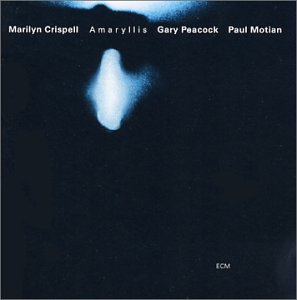 Women's History Month at HurdAudio finds ears tuned to Amaryllis, an understated masterpiece recorded in February of 2000 at the Avatar Studios of New York. As one of the most thrilling improvising pianists of this era, Marilyn Crispell exposes new territory for the piano trio format with some surprisingly restrained and slow tempo compositions with Gary Peacock on bass and Paul Motian on the drums. Crispell has enormous creative range as her ability to explode - as found on previous recordings - held me at the edge of my seat as she brings the same level of intensity to a more serene texture.
Women's History Month at HurdAudio finds ears tuned to Amaryllis, an understated masterpiece recorded in February of 2000 at the Avatar Studios of New York. As one of the most thrilling improvising pianists of this era, Marilyn Crispell exposes new territory for the piano trio format with some surprisingly restrained and slow tempo compositions with Gary Peacock on bass and Paul Motian on the drums. Crispell has enormous creative range as her ability to explode - as found on previous recordings - held me at the edge of my seat as she brings the same level of intensity to a more serene texture."Voice from the Past" is a Gary Peacock composition that opens this listening experience with some soft colors on the bass and drums before Crispell fills in the sonic space with some moody harmonies and a great melodic focus. It's clear right from the start that these players are in rare form for this session.
As the title track, "Amaryllis" is the first of four slow, freely improvised pieces that producer Manfred Eicher suggested recording. The sound is unbelievably beautiful as these three players listen deeply to one another and paint a vibrant soundscape with plenty of space for phrases and harmonic movements to shimmer.
"Requiem" opens with a melodic line running in parallel between the piano and bass before Peacock and Motian settle into a dialogue between the bass and drums. The acoustic bass sounds deftly melodic against a light tapestry of cymbals and soft snare. Crispell then joins in the conversation with echoes of the bass melodies over some nice comping in the left hand. The initial melodic line returns with the bass and drums supporting the piano part. This one is a Gary Peacock composition that deserves many more interpretations.
"Conception Vessel/Circle Dance" is a Paul Motian creation. Here Crispell begins with simple lines - often reinforced as octaves - that slowly expand to include more harmonic variation even as the melodic momentum persists. The energy in the drums matches the ebb and flow of this improvisation perfectly. There are occasional flashes of groove emerging from this texture. Most of the time, these performers allow grooves to be implied and are rarely explicit.
"Voices" is the second free improvisation. Again, the bass and drums shade the canvas for soft strokes from the ivories. It's amazing how energetic something so slow and quiet can sound. It takes a rare combination of talent and interaction to leave such a shimmering impression.
"December Greenwings" is a Gary Peacock composition that opens with some parallel lines in the piano part. Crispell then stays close to the high-mid to high register of the piano as the bass and drums converse lightly underneath. Peacock then wanders briefly into the thin, high registers of the bass as Crispell expands her own range of exploration.
"Silence (for P.)" is a short Crispell composition that gently lays out some harmonic changes on the piano and melodic phrasing that seems to nod toward Bill Evans just as Gary Peacock steps into the foreground with a great solo that submerges into wisps as Crispell closes this one out with a mere whisper.
"M. E. (for Manfred Eicher)" is the third free improvisation - named after the producer and cofounder of the ECM label that released this work. The brush work by Paul Motian is outstanding on this one. In the final minute this trio seems to surge toward a climax before settling back into the shimmering, resonate texture that dominates this sound.
"Rounds" is a Marilyn Crispell composition that builds around expanding melodic fragments as Peacock works counterpoint underneath. Motian works a fabric of free flowing cymbals and snare that roll silently at varying dynamics and density levels. There's a liquid quality to this piece as it leaves ripples in its wake.
"Avatar" is the fourth free improvisation - named after the studio it was recorded in. Here, the piano of Marilyn Crispell is the driving force as the bass and drums respond with supportive, spacious material.
"Morpion" (a Paul Motian composition) opens with a back-and-forth as Crispell and Motian trade solos of intense, creative energy that stops just short of bursting the meditative sheen found throughout this disc. The drum rolls crescendo just a bit faster on this track and the heat of the molten lava of Crispell's pianistic force can just about be felt even if the eruption never really materializes.
Things then conclude with "Prayer" by Mitchel Weiss. Closing with the meditative tone that has long been Crispell's inspiration and strength.


No comments:
Post a Comment